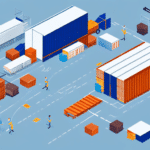The Benefits of On-Demand Trucking for Businesses
In today's fast-paced business landscape, time and cost-efficiency are essential for any company to thrive. One area where businesses can achieve both of these goals is in their logistics and transportation operations. On-demand trucking has emerged as a viable solution for businesses looking to streamline their transportation needs. This article examines the many benefits of on-demand trucking for businesses, from cost savings to improved supply chain efficiency, and everything in between.
Time and Cost Savings with On-Demand Trucking
One of the most significant advantages of on-demand trucking is its ability to save businesses both time and money. Traditional freight services require businesses to book shipments days or even weeks in advance, leaving little room for flexibility when unforeseen circumstances arise. This rigidity can result in lost revenue or increased expenses. On-demand trucking, however, allows businesses to schedule shipments on short notice, providing a degree of flexibility that traditional freight services simply cannot match.
This flexibility translates into cost savings, as businesses do not need to pay for excess capacity or wait for optimal shipment times. According to a Statista report, the on-demand trucking market is expected to continue its rapid growth, driven by the demand for more efficient logistics solutions.
Real-Time Tracking and Monitoring
In addition to flexibility and cost savings, on-demand trucking provides businesses with real-time tracking and monitoring of their shipments. Utilizing GPS technology, businesses can track their shipments in real-time, allowing them to make informed decisions and adjustments to their supply chain. This level of visibility enhances customer service by providing accurate and up-to-date information on shipment status.
Real-time tracking also helps in minimizing delays and optimizing delivery routes, further improving overall supply chain efficiency.
Advantages Over Traditional Freight Services
On-demand trucking offers several advantages over traditional freight services, making it an attractive option for businesses:
- Greater Flexibility and Reliability: Businesses can respond quickly to changing shipping needs without the constraints of long booking times.
- Cost-Effectiveness: Pay only for the services needed, avoiding costs associated with maintaining excess capacity.
- Real-Time Communication: Enhanced communication with drivers provides greater visibility and control over shipments.
Environmental Benefits
Another advantage of on-demand trucking is its potential to reduce a business's carbon footprint. On-demand trucking companies often utilize newer, more fuel-efficient vehicles and optimize their routes to minimize emissions. This can be a significant benefit for businesses looking to reduce their environmental impact and meet sustainability goals. A U.S. Environmental Protection Agency report highlights the importance of fuel efficiency in reducing transportation-related emissions.
The Role of Technology in On-Demand Trucking
Technology plays a crucial role in the success of on-demand trucking services for businesses. Advanced logistics technology is used to optimize routes, track shipments, and communicate with drivers in real-time, enhancing efficiency, accuracy, and visibility throughout the shipping process.
Online Platforms and Management Tools
Many on-demand trucking companies offer online platforms that enable businesses to easily book and manage shipments. These platforms provide transparency and control over shipping operations, allowing businesses to monitor their logistics in real-time.
Data Analytics
Data analytics is transforming on-demand trucking by allowing companies to collect and analyze data on shipping patterns. This enables the identification of areas for improvement and supports data-driven decisions to optimize operations, leading to faster delivery times, lower costs, and improved customer satisfaction.
Innovative Technologies
Emerging technologies such as drones, autonomous vehicles, and artificial intelligence are further driving innovation in the on-demand trucking industry. These technologies promise to enhance delivery efficiency and predict demand, ensuring better fleet management and service offerings.
Improving Supply Chain Efficiency
On-demand trucking can significantly improve supply chain efficiency for businesses. By providing flexibility and real-time tracking, on-demand trucking services help businesses optimize their supply chains and reduce waste.
Reduced Lead and Delivery Times
On-demand trucking can reduce lead times and improve delivery schedules, enhancing overall supply chain efficiency. This results in cost savings and increased revenue for businesses by ensuring timely deliveries.
Adaptive Response to Demand Fluctuations
Businesses can quickly respond to unexpected changes in demand or supply using on-demand trucking services. For instance, during a surge in demand, businesses can scale their transportation needs without the delay of traditional booking processes, thereby avoiding stockouts and lost sales.
Strategies for Integrating On-Demand Trucking
Integrating on-demand trucking services into a business model requires strategic planning and analysis. Here are some key strategies to consider:
Evaluate Current Shipping Needs
Businesses should first assess their current shipping requirements and compare the costs and benefits of traditional freight services versus on-demand trucking. This evaluation helps determine the viability of incorporating on-demand trucking into their logistics strategy.
Select a Reliable On-Demand Trucking Partner
Research and select an on-demand trucking company with a proven track record of reliability and success. Reviewing customer testimonials and case studies can aid in making an informed decision.
Establish Clear Communication
Clear communication and setting expectations are crucial for a successful partnership. Provide detailed shipment information, including cargo size, weight, pickup and delivery locations, and any special handling requirements. Establishing a timeline and communicating potential delays ensures smooth operations.
Understanding Different Types of On-Demand Trucking Services
There are various types of on-demand trucking services available to meet diverse business needs:
- Small Parcel Delivery: Ideal for businesses needing to transport small packages quickly.
- Large-Scale Freight Transportation: Suitable for businesses requiring the movement of large quantities or oversized items.
- Specialized Services: Includes options like expedited shipping, temperature-controlled transport, and hazardous material handling.
Delivery Speed and Flexibility
On-demand trucking services vary in delivery speed, with options ranging from same-day to several-day deliveries. Additionally, some services may have restrictions on the types of goods transported or delivery locations, so businesses should choose services that align with their specific needs.
The Future of On-Demand Trucking and Its Impact
The future of on-demand trucking is promising, with increasing adoption expected to drive competitive pricing and higher service quality. Technological advancements will further enhance the efficiency and effectiveness of on-demand trucking for businesses.
Increased Adoption and Market Growth
The on-demand trucking market is projected to grow significantly in the coming years, driven by businesses seeking more flexible and efficient logistics solutions. This growth will likely lead to more competitive pricing and innovative service offerings.
Technological Advancements
Advancements in technology, such as artificial intelligence and autonomous vehicles, will continue to transform the on-demand trucking industry. These innovations will improve route optimization, demand prediction, and fleet management, further increasing the efficiency of on-demand trucking services.
Sustainability and Environmental Impact
On-demand trucking can contribute to sustainability efforts by optimizing routes to reduce empty miles and using more fuel-efficient vehicles. Businesses focused on reducing their carbon footprint will find on-demand trucking to be an aligned solution.
Case Studies: Success Stories in On-Demand Trucking
Real-life case studies demonstrate the tangible benefits of on-demand trucking for businesses across various industries:
Food Delivery Services
A food delivery service integrated on-demand trucking to reduce delivery times and maintain food quality by ensuring timely and fresh deliveries. This led to increased customer satisfaction and repeat business.
Construction Companies
A construction company utilized on-demand trucking to transport materials to job sites efficiently. This reduced transportation costs and improved project timelines, resulting in higher profitability and enhanced customer satisfaction.
E-commerce Businesses
E-commerce companies have leveraged on-demand trucking to handle fluctuating order volumes, particularly during peak seasons. This flexibility helped them manage inventory more effectively and meet customer demands promptly.
Addressing Common Misconceptions About On-Demand Trucking
Several misconceptions can discourage businesses from exploring on-demand trucking. Addressing these misconceptions can help businesses make informed decisions:
Cost Concerns
A common misconception is that on-demand trucking is too expensive. In reality, on-demand trucking can be more cost-effective than traditional freight services, as businesses pay only for the services they need, avoiding the costs associated with maintaining excess capacity.
Reliability and Safety
Some businesses worry about the reliability and safety of on-demand trucking services. However, reputable on-demand trucking companies implement stringent safety protocols and offer high reliability comparable to, or better than, traditional freight services.
Scalability and Versatility
Another misconception is that on-demand trucking is only suitable for small businesses or short distances. On-demand trucking services are scalable and can accommodate businesses of all sizes, handling long-distance shipments and a wide range of cargo types, including perishable, hazardous, and oversized items.
Conclusion
On-demand trucking offers numerous benefits for businesses aiming to optimize their transportation and logistics operations. From cost savings and improved efficiency to greater flexibility and enhanced supply chain visibility, on-demand trucking can significantly impact a business's bottom line. As the logistics landscape continues to evolve, integrating on-demand trucking services into a comprehensive logistics strategy will be increasingly advantageous for businesses striving for competitive edge and operational excellence.
By evaluating their shipping needs, selecting reliable partners, and leveraging advanced technologies, businesses can fully harness the benefits of on-demand trucking. This strategic approach not only supports current operational demands but also positions businesses for future growth and adaptability in a dynamic market environment.




















